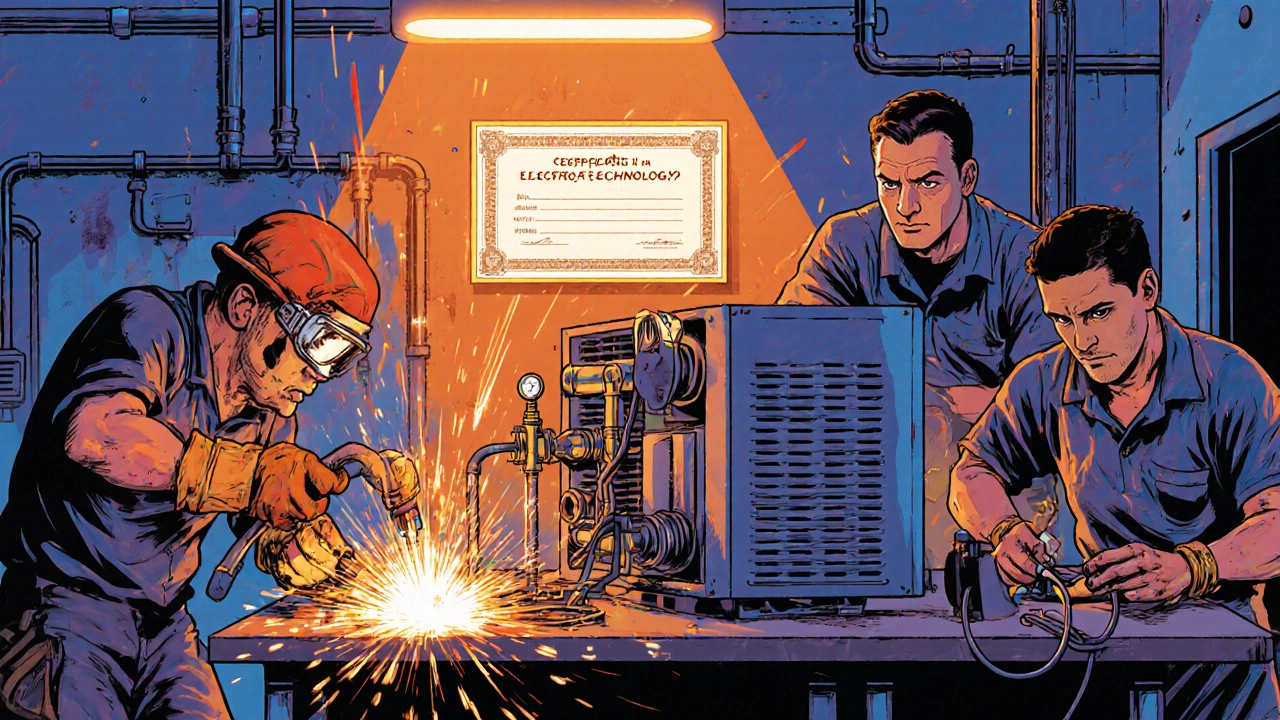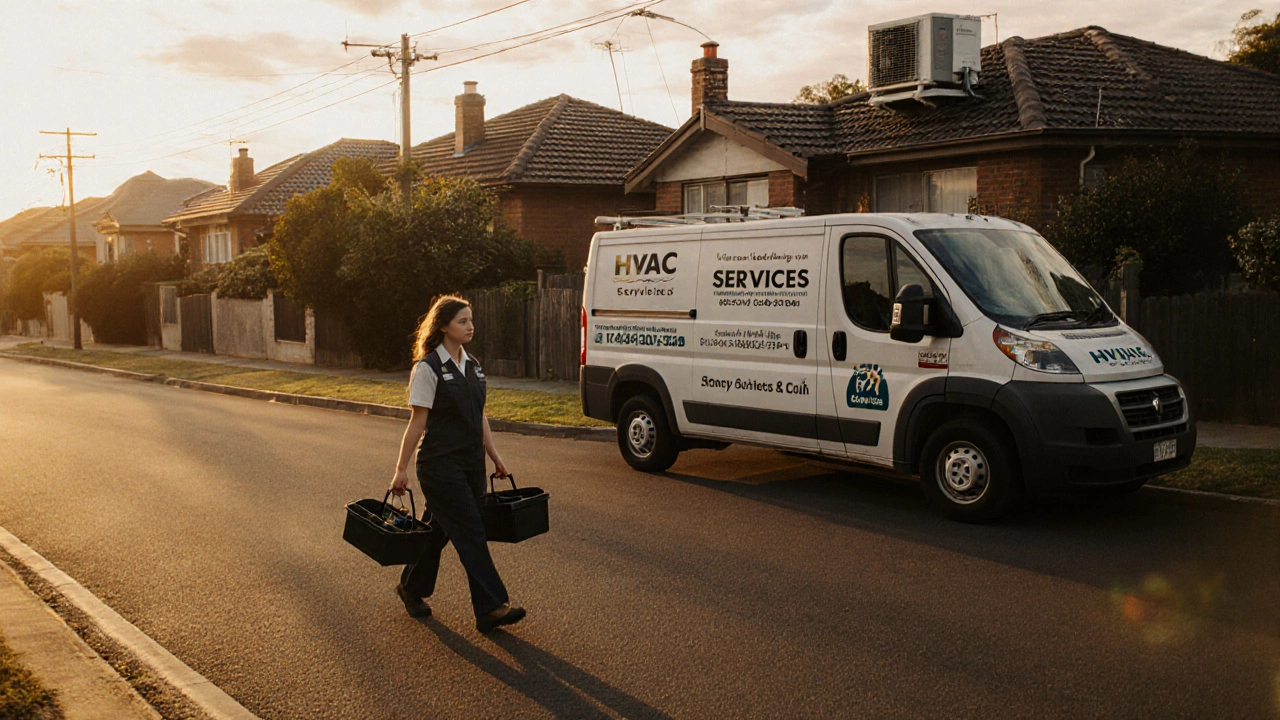Want to start earning quickly-without spending years in school? You’re not alone. More people in Australia and around the world are skipping traditional degrees and turning to skilled trades. The truth? Some trades can be learned in under six months, and you can start making decent money before your first year is up.
Why trades beat degrees for speed and income
A four-year university degree can cost $50,000 or more and leave you with debt. Meanwhile, a qualified electrician in Australia earns an average of $85,000 a year, and many start earning $50,000+ within 12 months of training. The same goes for plumbers, welders, and HVAC technicians. These aren’t side gigs-they’re full careers with benefits, job security, and room to grow.Trades don’t need fancy theory. They need hands-on practice. That’s why you can go from zero to certified faster than you can finish a bachelor’s degree. Many courses now offer flexible schedules, online theory, and weekend workshops. You don’t need to quit your job to start.
The top 3 quickest trades to learn in 2025
- Electrician’s Assistant (Level 1) - Most community colleges and TAFEs offer a 6-month Certificate II in Electrotechnology. You’ll learn wiring basics, safety rules, and how to install outlets and switches. After that, you can work under a licensed electrician while finishing your apprenticeship. Many start earning $25-$35/hour within 4 months.
- Plumbing Assistant - A 4-6 month Certificate II in Plumbing prepares you to handle drain cleaning, pipe fitting, and basic fixture installations. You’ll work with PVC, copper, and PEX. In Sydney, demand is high because of new housing builds. Entry-level assistants make $28-$40/hour, and overtime is common.
- HVAC Technician (Cooling & Heating) - With extreme heat becoming normal in Australian summers, air conditioning repair is booming. A 5-month Certificate III in Refrigeration and Air Conditioning teaches you to install, fix, and maintain units. You’ll learn about refrigerants, electrical circuits, and diagnostics. Entry-level techs earn $30-$45/hour, and many get called out on weekends.
These aren’t just "easy" jobs-they’re essential services. People always need power, water, and cool air. That’s why these trades have near-zero unemployment rates.
How to start learning one of these trades
- Check your eligibility - Most courses require you to be 16+, have a clean criminal record, and be physically able to lift 25kg. No prior experience needed.
- Find a government-subsidised course - In NSW, the Smart and Skilled program cuts course fees by up to 90% for eligible students. Similar programs exist in Victoria (VET Student Loans), Queensland (Skills Queensland), and WA (Skills for All).
- Choose a provider with job placement - Look for TAFEs or private colleges that partner with local tradespeople. Ask: "Do you help students find apprenticeships?" If they say no, keep looking.
- Start with theory online - Many providers let you complete the theory part via video lessons. This means you can study nights and weekends while keeping your current job.
- Get hands-on fast - The moment you’re ready, sign up for a practical block. Most courses include 1-2 weeks of real-site training with licensed workers.

What you’ll actually do on the job (no fluff)
Let’s say you become an HVAC assistant. Your first week might look like this:
- Monday: Help install a split-system unit in a new home in Parramatta
- Tuesday: Clean filters and check refrigerant levels on a broken unit in Liverpool
- Wednesday: Learn how to use a manifold gauge to diagnose a leak
- Thursday: Shadow a senior tech fixing a commercial air conditioner at a warehouse
- Friday: Fill out service reports and pack tools
You’re not just watching-you’re doing real work. And you’re getting paid for it.
Real people, real results
James, 29, was working retail in Brisbane. He spent $3,200 on a 6-month Certificate II in Electrotechnology through Smart and Skilled. After 5 months, he started working part-time as an assistant. By month 8, he was full-time at $32/hour. He’s now saving for his electrician’s license.
Maya, 22, dropped out of university after two semesters. She took a 5-month plumbing course in Adelaide. Her first job was with a local family-run plumbing business. She’s now earning $41/hour and works 50 hours a week during summer. She doesn’t miss student loans.
These aren’t outliers. They’re the norm in today’s trade economy.
What trades to avoid if you want speed
Not all trades are quick. Avoid these if you’re in a hurry:
- Carpentry - Requires 4 years of apprenticeship. Slow start.
- Blacksmithing - Niche field. Few jobs.
- Boatbuilding - Seasonal, regional, and highly competitive.
Stick to trades with high demand, clear certification paths, and lots of entry-level roles. That’s where the fast money is.

What tools and gear you need to start
You don’t need a garage full of equipment. Most courses provide tools for training. But when you land your first job, you’ll need:
- Steel-toe boots (AS/NZS 2210.3 certified)
- Work gloves (cut-resistant)
- Tool belt with basic screwdrivers, pliers, tape measure
- Multi-meter (for electricians)
- Leak detector (for HVAC)
Most beginners spend under $500 on gear. Many employers provide tools after probation.
Can you really make $60k+ in a year?
Yes-if you’re smart about it.
Here’s the math:
- Start at $28/hour as an assistant
- Work 40 hours/week = $1,120/week
- Work 50 weeks/year = $56,000
- Add overtime (2-3 extra hours/week) = +$8,000+
- Weekend call-outs = +$5,000+
That’s $69,000 before taxes. And you didn’t need a degree.
Next steps: What to do right now
Don’t wait for "the right time." The right time is now.
- Go to your state’s skills website: Smart and Skilled (NSW), Skills Victoria, Skills Queensland
- Search for "Certificate II in Electrotechnology" or "Certificate II in Plumbing"
- Filter for courses starting in the next 30 days
- Call the college. Ask: "Can I start next Monday?"
- Apply. Get approved. Show up.
Every day you wait is a day you’re not earning. Trades don’t care about your resume. They care about your hands, your attitude, and your willingness to show up.
What’s the fastest trade to learn with no experience?
The fastest trades with no experience required are Electrician’s Assistant, Plumbing Assistant, and HVAC Technician. Each can be started with a 4-6 month government-subsidised course. You’ll begin earning within months, not years.
Can I learn a trade online?
You can learn the theory online-safety rules, wiring diagrams, plumbing codes-but you must do hands-on training in person. Most courses mix online lessons with weekend workshops or weekly lab sessions. No trade license is granted without practical experience.
Are trade jobs stable in Australia?
Yes. Trade jobs are among the most stable in Australia. Housing construction, aged care upgrades, and extreme weather events keep demand high. The Australian Government lists electricians, plumbers, and HVAC techs as priority occupations for skilled migration. Unemployment in these fields is under 2%.
Do I need a license to start working?
You don’t need a full license to start as an assistant. You work under a licensed tradesperson while you complete your apprenticeship. After 3-4 years, you’ll sit for your full license exam. But you can earn money from day one as a trainee.
How much does it cost to learn a trade?
With government subsidies, many courses cost under $1,000. In NSW, Smart and Skilled reduces fees to $100-$500 for eligible students. Without subsidies, expect $3,000-$6,000. Compare that to $20,000+ for a university degree.
